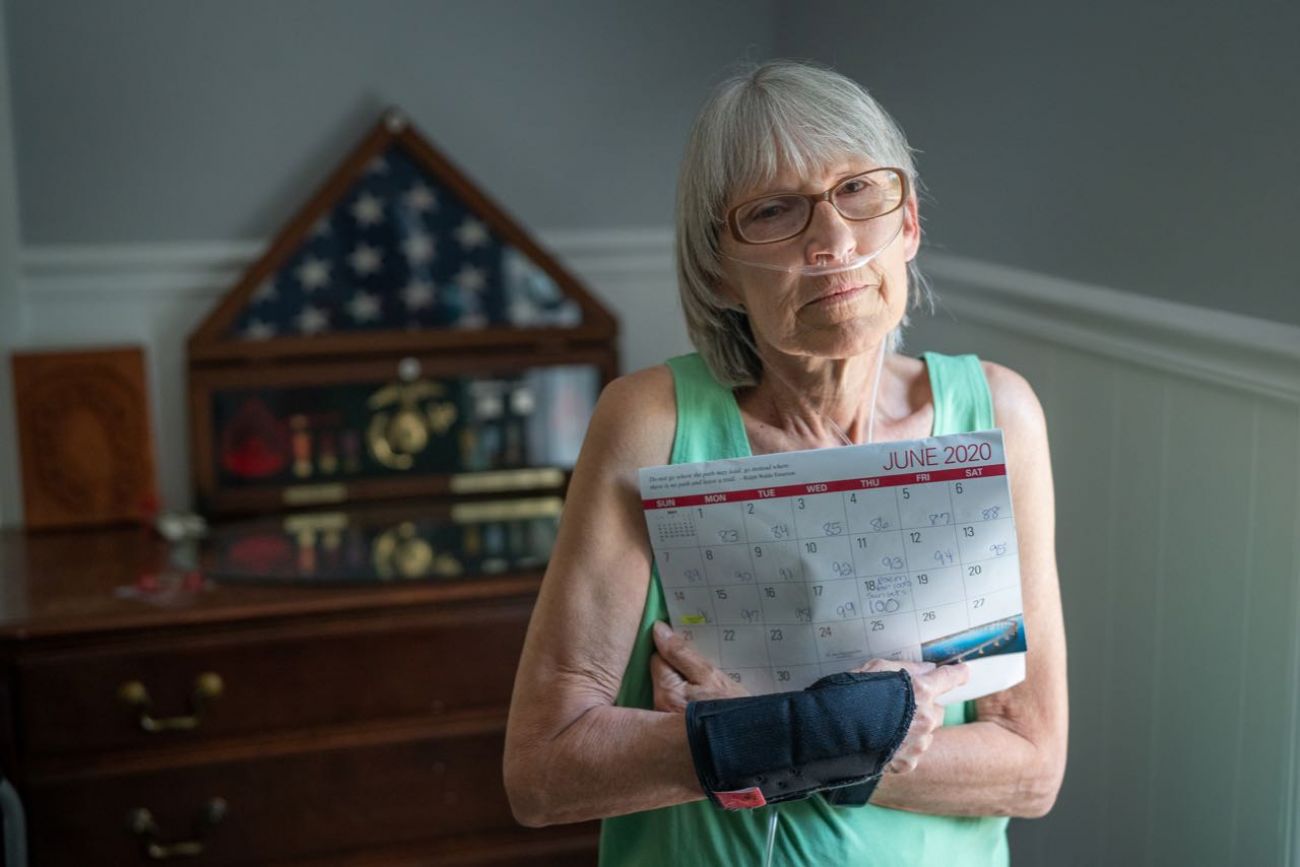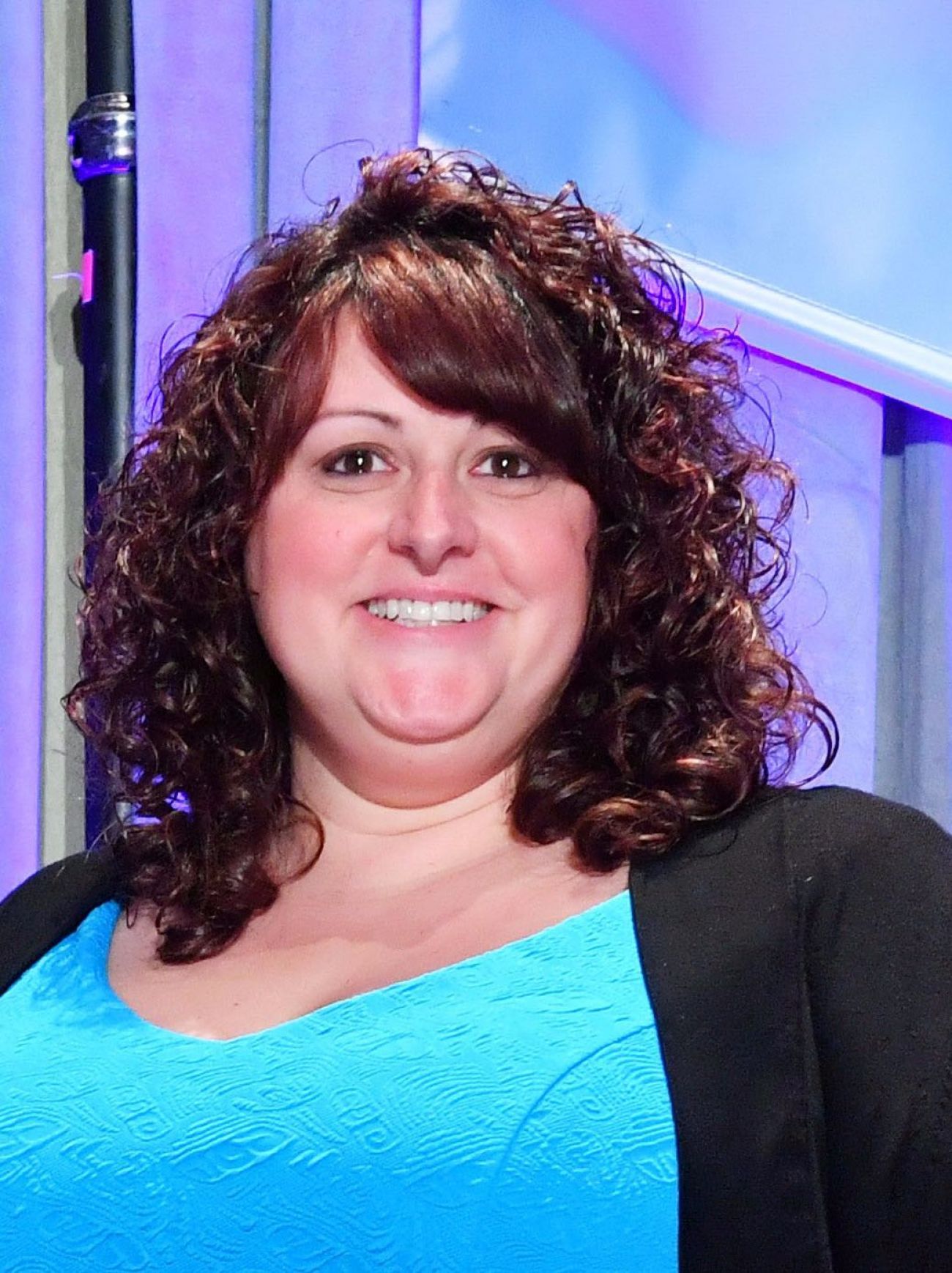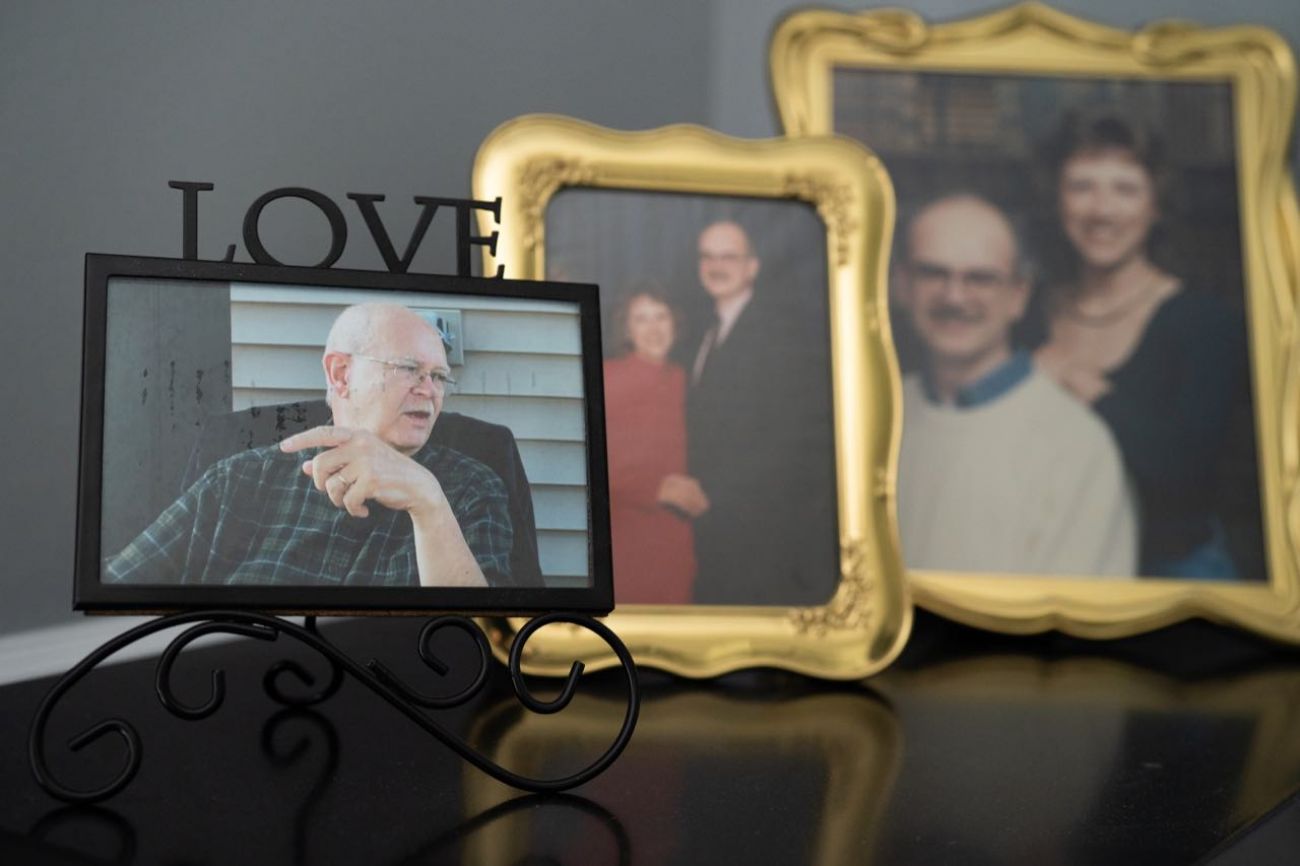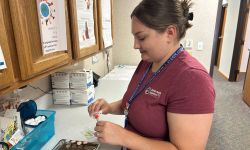In Michigan nursing homes, a no-win choice between infection and isolation

Alzheimer’s disease has shrunk the world around him, but Jerry Zeiger — Vietnam veteran, former engineer and hobby woodworker — is still soothed by the touch of the woman he took out on a first date over a simple cup of truck-stop coffee.
“I guess I was so enthralled by him, I didn’t notice my surroundings,” Melanie Zeiger, 65, said laughing at the memory, now 29 years old.
This spring — nearly 27 years after they said “I do” in a small church in West Michigan — Melanie Zeiger stood outside her husband’s nursing home window in Kalamazoo, as 72-year-old Jerry Zeiger’s hands scraped at the window trying to reach her.
“He was reacting almost like a caged animal. I had to walk away and neutralize [the situation],” she said, emotion snatching at her words.
“I had to do it. It’s not in his best interest to be agitated.”
- More than 1,900 coronavirus deaths in Michigan nursing homes
- Inspections show death, despair gripped Michigan nursing homes amid pandemic
- The latest: Michigan coronavirus unemployment, map, curve, updated COVID-19 news
- Dashboard: Michigan coronavirus testing numbers, trends, COVID-19 data
Nearly 3½ months after Michigan confirmed its first cases of COVID-19, countless Michiganders like Melanie Zeiger are still separated from spouses, parents, grandparents and other loved ones in nursing homes and other long-term care facilities.
While bans on hospital visits have been loosened, those regarding nursing homes remain in place, with families missing birthdays, anniversaries, religious holidays and Mother’s Day celebrations. On Sunday, some of those same families will be unable to celebrate Father’s Day together.
The current extension of the executive order banning nursing home visits is set to expire at 11:59 p.m. June 26. It’s not clear whether it will be extended again, modified or lifted, according to Gov. Gretchen Whitmer spokesman Bobby Leddy.
“Governor Whitmer’s top priority is the health and safety of Michiganders. We’ll be working closely with stakeholders on how to most safely re-open when the time is right, based on the state’s top data and medical expertise,” Leddy said.
And while the visitation ban has aimed at limiting the spread of COVID-19 in nursing homes, which house some of the state’s most vulnerable citizens, it has also isolated the sick and elderly from their loved ones since mid-March.
“Social isolation now is creating more problems in our view than COVID-19,” said Kevin Evans, executive director of the Martha T. Berry Medical Care Facility in Macomb County.
A series of executive orders meant to protect Michigan’s long-term care residents against COVID-19 began March 13 with a ban on visitors in all but “exigent circumstances.” At the same time under guidance by the U.S. Centers for Disease Control and Prevention, shared meals were canceled. So, too, were group activities and outings.
That means, too, that volunteer groups no longer bring in song, dance, games, treats, new books to read or faith devotions.
And all this quiet, in turn, makes room for what the Eden Alternative, a nonprofit focused on elder well-being in long-term care, calls three plagues of nursing homes: loneliness, helplessness and boredom.
“The way to overcome those are with meaningful relationships,” Evans told Bridge. “But how do you do that when the state is telling you (that you) can’t leave your room and … those around you are wearing masks and you can’t see their smiles?”
The state’s own data is the most sobering reminder of the vulnerability of its residents to COVID-19, a virus that Mark Parkinson, president and CEO of the American Health Care Association which represents the nation’s long-term care industry, called in March an “almost perfect killing machine” among the elderly.
As of Wednesday, at least 1,976 of the state’s 5,818 deaths — 1 in 3 — were among nursing home residents. An additional 24 deaths were among nursing home staff. And those numbers don’t include deaths in assisted living facilities.
“Our residents are the most vulnerable because of their age and because they are immunocompromised,” said Cindy Liukkonen, activity director at the Christian Park Health Care Center in Escanaba, in the Upper Peninsula. “We don’t want to have someone catch this when it could have been prevented.”
On Wednesday, a work group named by Whitmer submitted a 10-page plan to Whitmer’s office that recommends a phased-in lifting of the visitation ban. Evans — whose own home recorded 22 deaths of residents who also were infected with COVID-19, according to state data — helped lead the group.
Under the working group’s plan, a facility will continue to ban visitors while there is current “community spread” of COVID-19 cases, meaning people are still being infected without knowing how they were exposed, or when the home develops two or more new cases in areas of the building designated as non-COVID-19.
Fourteen days after a final positive or suspected case among residents or staff, the facility may enter a Phase 2, which will allow limited, appointment-only visitation — only for “residents with significant changes in condition including psycho-social or medical issues.”
After an additional 14 days without coronavirus cases, indoor visitation can expand to include all residents without a COVID-19 infection.
In all phases, visitors will be screened before visitation.
The plan must be first approved by Whitmer and then by the U.S. Centers for Medicare and Medicaid Services, Evans said. And nursing home visitation returns to normal only after CMS releases the state from the pandemic plan, Evans said.
Balancing infection control and isolation concerns, while fielding concerns from frustrated family members and trying to help residents understand, has made the past three months seem “like a year,” Evans said.
Meanwhile, families have done what they can to stay in contact with their loved ones.
At Advantage Living Center in Battle Creek, family members have propped up lawn chairs outside of loved ones’ rooms, armed with bug spray, sunscreen and milkshakes and slushies. Inside the room, a resident can talk to those outside by phone. Among the visitors recently were a resident’s young relatives — a smiling bride and groom still in tuxedo and dress.
“Even in a pandemic, you can still be creative,” said administrator Akhil Vijay.
But even the sweetest moments are bittersweet when bisected by a glass window.

“It’s wonderful, but it’s sad at the same time, they’re so far away,” said Liukkonen in Escanaba.
They may talk and laugh and reminisce, she said, but “they can’t hold them, they can’t hug then, they can’t hold their hands.”
In the worst cases, “they’re watching their loved ones die from a window,” she said. “It’s devastating. It’s truly heartbreaking, when you have to say goodbye by video.”
Virtual visits at their best are “a pale comparison” to the real thing, Evans said. “Human touch means so much. No amount of FaceTime can replace a hug from a grandchild.”
For some, virtual visits are simply not an option.
‘Those with Alzheimer’s or dementia — they can see their person, and then they try to move their telephone or screen aside, because they think their person is behind it. We have to keep reminding them, ‘It’s like a TV,’” said Liukkonen in Escanaba.
“You have the occasional one where it’s too upsetting. They can’t wrap their mind around it that their family member isn’t there,” she said. “In those cases, it’s back to a phone call.”
As the center’s activity director for 19 years, Liukkonen has rooted her work in a beyond-bingo mission that “people don’t come to nursing homes to die, but to live.” The pandemic “really tests our creativity.”
On May 15, family members lined in a seven-minute caravan of cars and trucks, driving past Christian Park Health Care Center in Escanaba as residents sat in the parking lot — socially-distanced with one wheelchair per parking space. Banners flew from the passing cars and trucks: “Love you Mom,” read one. Residents held their own signs, “I miss you,” read one. “I’m doing well,” read another.
As she recorded the parade on her cell phone for a video posted to the center’s Facebook page, Liukkonen said, “I was wiping away tears.”
Staff feels the toll, too, especially when residents can’t understand COVID-19 or why everyone is masked, said Jennifer Palmer, life enrichment director at New Friends Memory Care & Assisted Living Facility in Kalamazoo. It was there that Jerry Zeiger tried to reach for his wife through the window.
The center’s staff facilitates 10 to 20 virtual visits a day, Palmer said. Sometimes families try to explain the virus. But for a person with memory issues, the explanation can agitate more than comfort, she said.
“These [residents] are our family too, and it’s distressing. You go home heartbroken. It’s just horrible,” she said.

On Wednesday, Melanie Zeiger sat down in her Portage home — a small house she purchased to be just six miles from New Friends. She had already inked in black “99 days” on the calendar clipped to the side of a metal cabinet — 99 days, she said, since the last time she’d been able to visit in-person with her husband.
She wrote out a poem for him: “I can’t hold you anymore but it’s you I’m fighting for,” she wrote. “The waves wash to the shore but night leaves me all alone.”
Melanie Ziegler told Bridge she believes there must be a way to triage nursing home residents — those with cognitive issues and dementia — who are most in need of their loved ones’ touch.
“The same people charged with the best interest of these [residents] now are prohibited from seeing them,” she said. “I don't know what to do. How do you fight that battle? My guy, the love of my life, is going to die of a broken heart, and there’s nothing I can do about that.”
See what new members are saying about why they donated to Bridge Michigan:
- “In order for this information to be accurate and unbiased it must be underwritten by its readers, not by special interests.” - Larry S.
- “Not many other media sources report on the topics Bridge does.” - Susan B.
- “Your journalism is outstanding and rare these days.” - Mark S.
If you want to ensure the future of nonpartisan, nonprofit Michigan journalism, please become a member today. You, too, will be asked why you donated and maybe we'll feature your quote next time!








